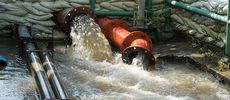Hiring Ex-Military Employees in the Water Industry With New Language


José Martinez is the general manager of Otay Water District, approximately 125 square miles of southeastern San Diego County in California. Martinez is also a former Navy nuclear engineer, and he thinks there's more the water industry can do to hire other ex-military members as employees.
He recently talked with us about why he thinks the water industry's aging infrastructure and workforce combine well with the 250,000 U.S. military members leaving military service each year—and how language changes for job seekers and hiring departments can help fill those roles in the water industry.
Changing How We Read Resumes
Martinez: Like water industry employees, individuals in the military branches follow documented procedures and learn on the job. But because military roles usually have different titles than civilian ones, we often take a step or two down in our first civilian job.
I did. As an engineer in the Navy, I managed individuals across three divisions. But in my initial civilian work, it was necessary for managers to get to know me first. Then they became aware of my capabilities and experience.
We need to change our awareness of what roles in the military do so we can tell they'd be a good fit in water.
After that experience, I realized I needed to publicize veterans' potential in water—because if I had those challenges, think of people who had 10 years of experience in HR or administrative experience; they're going to have a harder time transferring over to well-paying civilian roles.
While there are plenty of technically trained military individuals, I don't want to limit recruiting to skilled trade jobs. On a ship, as in a water district, there are people who do a little of everything. The military has administrative assistants (called "yeomen"), payroll specialists, managers, and individuals in various technical areas. All of these are employees that water districts need. First, we need to learn to read resumes differently and make military individuals aware there are suitable jobs for them in water.
For instance, at Otay, we hired someone with military experience in machinist maintenance. That person's application was first rejected by our resume reviewing system in HR because the title used in the military was different from in water. But I looked at the resume and recognized that their skills were a fit for our needs.
A machinist in the military tends to do what our water industry equipment specialists do: They take apart motors, operate and maintain pumps, fix things, and get them working again. A military-trained machinist is a real asset in water work. Fuel and water systems technicians is another military role that fits well into the water industry.
Do More to Recruit Former Military Members
Martinez: Because of years of intentional, mindful efforts on the part of industry individuals through groups such as the American Water Works Association (AWWA), there's an awareness that the military is a great place to recruit employees from.
Currently, with the AWWA veterans committee and the AWWA California-Nevada Section veterans division, I'm working on committees to change the language used. With an AWWA team member in HR at a water district, we're working to adjust the language hiring offices use in job listings and their reading of resumes. We're also trying to publicize the opportunities we have to departing and ex-military members.
Providing a Path to Hiring Veterans
Martinez: The AWWA veterans committee and the AWWA California and Nevada section's veterans committee have both worked in recent years to communicate that ex-military and water are a natural fit.
In 2019, California Governor Gavin Newsom signed the bill AB 1588 into law, providing a path for veterans moving into civilian employment areas to receive credit for their military experience and education toward certifications in the water industry. Otay Water District and San Diego County Water Authority co-sponsored the bill.
There's also a great program called SkillBridge from the Department of Defense (DOD). In this program, someone who has filled out their paperwork to leave the military can have the opportunity to work in a public or private company as an intern or employee for their last six months of military service. While continuing to receive their military salary, they train or work at the new company. They can figure out what role they want to perform, or the company may realize it wants to hire them.
Learn more here about retention and recruiting in a few steps.






